STEWARDSHIP (VOLUNTEERISM—TITHING YOUR TIME)
Sunday, November 6, 2011
“Wake Up Everybody”
(performed by John Legend, featuring The Roots, Common & Melanie Fiona)
Guest Writer for This Unit: Larry L. Enis is a doctoral candidate in New Testament studies at Union Presbyterian Seminary and an associate minister at Saint Paul’s Baptist Church in Richmond, VA.
The unit you are viewing, Stewardship (Volunteerism—Tithing Your Time), is a compact unit. This means that it is not a complete commentary of the Scripture(s) selected for this day on the calendar, nor does it have a full, supporting cultural resource unit and worship unit. Instead, to enliven the imagination of preachers and teachers, we have provided a sermonic outline, songs, suggested books, and suggested articles, links, and videos. For additional information see Stewardship in the 2008, 2009, and 2010 archives of the Lectionary. 2011 is the first year that the African American Lectionary has posted compact units for moments on its liturgical calendar.
I. Description of the Liturgical Moment
A day designated for celebrating stewardship suggests that we, as creations of God, have been called and empowered by God to contribute to the work of God. The objective of this liturgical moment is to celebrate the significance of “good works”—works that benefit others first. Such works glorify God; that is, they demonstrate the goodness of God working through us. This moment is designed to encourage and challenge worshippers not just to reflect on ways they might make a positive difference in their environments, but to put those ways into practice—to “walk in them” (Ephesians 2:10). It is designed to compel congregants to embrace their role as the hands of God on the earth, as recognizable extensions of God’s love, as conduits through which the Spirit of God may freely flow. This liturgical moment emphasizes the point that employment of “good works” is the consequence of a new life in Christ.
With this material as our backdrop, we provide a sermonic outline for Stewardship (Volunteerism—Tithing Your Time).
II. Stewardship (Volunteerism—Tithing Your Time): Sermonic Outline
A. Sermonic Focus Text: Ephesians 2:10 (New Revised Standard Version)
For we are what he has made us, created in Christ Jesus for good works, which God prepared beforehand to be our way of life.
B. Possible Title(s)
i. Walking in Good Works
ii. Becoming a Difference-Maker
iii. Do Something!
C. Point of Exegetical Inquiry
In any text there can be several words or phrases that require significant exegetical inquiry. A significant term in Ephesians 2:10 is peripatéo. This term is commonly used to refer to one’s conduct, but means literally “to walk.” The NRSV translates the final clause of 2:10 as “to be our way of life,” thereby deviating, almost radically, from the Greek text. A more accurate translation of this final clause is “so that in them [i.e., the good works] we might walk.” The writer is encouraging recipients to walk in the good works which God has prepared beforehand. If the writer had wanted to communicate “way of life,” he could have done so more clearly. There are other terms he could have used, such as odos (“road” or “way”) and zoe (“life”), which are absent from this verse. What the writer aims to communicate is the importance of active participation in one’s efforts to lead a godly life—a Christian life characterized by “good works.”
The writer is compelling, urging, and challenging readers to do something, to move—to walk. A translation of peripatéo which emphasizes walking communicates a more specific call to action than the rendering found in the NRSV. The writer’s repeated use of peripatéo throughout Ephesians bolsters this point. For instance, in 4:1 he admonishes listeners to “walk worthy” of the call to which they have been called. Congregants are encouraged to “walk in love” (5:5) and to “walk as children of light” (5:8). They are commanded to see with care how they walk (5:15). Thus, in light of its literary context, Ephesians 2:10 is clearly calling readers not just to be about good works, but to do them—to walk in them.
III. Introduction
Born a slave in about 1798, Betsy Stockton was manumitted by her master in 1817, and subsequently admitted as a member of the First Presbyterian Church in Princeton, New Jersey. Given her expressed desire to do missionary work, she was soon thereafter commissioned by the American Board of Commissioners for Foreign Missions, becoming the first single African American woman sent overseas as a missionary. On November 22, 1822, she and a team comprised of all males set sail from New Haven, Connecticut on a five-month voyage to Hawaii. A master of the Word of God and of the English language, she selflessly devoted her time and her talent to “good works”—to the spiritual, educational, and social advancement of the disinherited. She used her talents, skills, and expertise to start a school where she taught English and Hawaiian. She was motivated not by self-exaltation but by service—by a genuine desire to make a positive difference in the lives of others. By availing herself for the betterment of others, she epitomized what it means to lead a Christian life—a life committed to making its presence felt. Betsy didn’t just contemplate good works; she walked in them.
We, too, as children of God, have a responsibility to use what God has given us to make a positive difference in the lives of others. As God’s handiwork, we too have been called by God to embody the spirit of Christ—a spirit characterized by love, righteousness, and selflessness. Like Betsy, we have a responsibility to impact our environments, to effect change, to walk in good works.
IV. Moves/Points
Move/Point One – This text addresses our identity (who we are).
Knowledge of who we are controls how we live our lives, the decisions we make, and the risks we take. To understand our identity is also critical for social interaction and our reaction to how society responds to us.
a. We are God’s masterpiece;
b. We are recipients of God’s grace; and
c. As such, we are the beloved of God.
Move 2/Point Two – This text addresses our purpose (why we exist).
a. We exist to do good works;
b. We exist to extend grace to others; and
c. We exist to be extensions of God’s love on earth.
Move 3/Point Three – This text addresses our assignment (what we should do).
a. We are to walk in good works;
b. We are to show grace to others; and
c. We are to walk in love.
V. Celebration
We celebrate the fact that, despite our circumstances, we have been blessed to be a blessing for others in some way. We celebrate that we are not just recipients of God’s love but instruments through which God’s love, God’s goodness, and God’s grace can flow. Our lives are better and more fulfilling—individually and collectively—if we are committed to serving others, if we embody the spirit of Christ, if we walk in good works. Thanks be to God for the privilege of serving others. Thanks be to God for the opportunity to lift the image of God in the earth in how we live and how we give of ourselves. Thanks be to God that we have learned not to just talk the talk but to walk the walk.
VI. Illustration
The Service Elevator
Mohammed Yunus, a businessman from Bangladesh, was awarded the Noble Peace Prize in 2006. Yunus is convinced that the way to bring peace to the world is by eradicating poverty. So, Yunus makes loans to people who are in poverty. As a consequence of his conviction, he loans money to poor people so that they can operate their own businesses and escape poverty; he has served his way to the top.
A few years ago I was in an African hotel, and my room was on the top floor. The sister who was showing me how to get to my room said I had to use the service elevator because no other elevator was working. That’s what Muhammad Yunus has done. He has recognized that in this life if you want to reach the top, you have to take the service elevator. That’s what’s going to take you up. You don’t have to connive. You don’t have to scheme. You don’t have to stab anybody in the back. The way to reach the top is through the service elevator.
—Frederick Douglas Haynes, III, Dallas, Texas
This illustration is taken from the Sermon Illustrations section of The African American Lectionary. See this section for additional illustrations that you may wish to use in presenting a sermon for this moment on the liturgical calendar.
VII. Sounds and Sights in This Passage
| Sounds: |
Praise—Recipients of this letter celebrating the fact that they are in a position to be a blessing in the lives of others; “Mm mm” and “That’s right”—The response of congregants after being informed or reminded of their identity as God’s masterpiece and their call to walk in good works.
|
| Sights: | Confidence—congregants’ facial expressions after hearing that they were created for the very purpose of doing good works; Contemplation—the facial expressions of other congregants as they ponder ways they might make a greater impact in their environments. |
VIII. Videos, Audio, and/or Interactive Media
IX. Books to Assist in Preparing Sermons or Bible Studies Related to Stewardship (Volunteerism—Tithing Your Time)
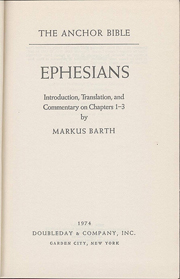
|
Barth, Markus. Ephesians 1–3: A New Translation with Introduction and Commentary.Garden City, NY: Doubleday, 1974. |
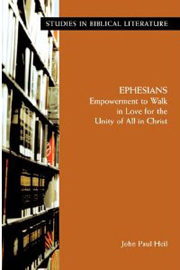
| Heil, John Paul. Ephesians: Empowerment to Walk in Love for the Unity of All in Christ. Atlanta, GA: Society of Biblical Literature, 2007. |
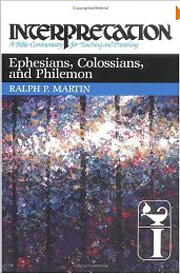
| Martin, Ralph P. Ephesians, Colossians, and Philemon (Interpretation: A Bible Commentary for Preaching and Teaching). Atlanta, GA: John Knox Press, 1991. |
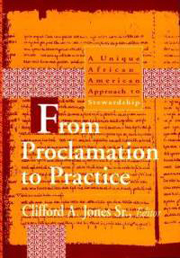
| Jones, Clifford A. From Proclamation to Practice: A Unique African American Approach to Stewardship. Valley Forge, PA: Judson Press, 1993. |
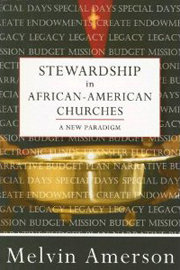
| Amerson, Melvin. Stewardship in African-American Churches: A New Paradigm. Nashville, TN: Discipleship Resources, 2006. |
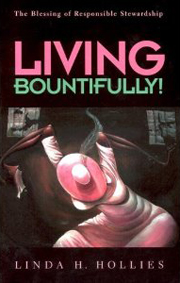
| Hollies, Linda H. Living Bountifully! The Blessing of Responsible Stewardship. Cleveland, OH: Pilgrim Press, 2005 |
X. Links to Helpful Websites
XI. Songs to Accompany This Sermon
A. Spirituals or Traditional Songs
- This Little Light of Mine.
- Take My Life, and Let It Be Consecrated. By Frances R. Havergal. Arr. by H. A. Malan
- Rule of Life. By John Wesley. Music by Edward Bonnemere
- What Shall I Render? By Margaret Pleasant Douroux
- Here I Am. By Nolan Williams, Jr.
B. Songs for Choirs, Ensembles, or Praise Teams
- My Offering. By Nolan Williams, Jr.
- All That I Have. By Andraé Crouch
- My Life Is Available to You. By Timothy Clifton
- Never Too Busy. By Brent Jones. For solo
C. Anthem
- God Made Our Hands. By T. Miller. Arr. by Hawley Ades
D. Modern Songs (Written between 2000–2010)
- Go. By Leon Patillo
- Give Till It Feels Good. By Glenn Evavold
- Things We Leave Behind. By Michael Card
- Wake Up Everybody. By Victor Carstarphen, Gene Mcfadden, and John Whitehead
- I Want to Be Like Jesus. By The Anointed Pace Sisters
- Well Done. By Deitrick Haddon
E. Offertory Song or Instrumental
- Bring a Gift of Love. By Mary Kay Bottens
- You Can’t Beat God Giving. By Doris Akers
- Offertory. By John Ness Beck. For SATB with optional string quartet
F. Song or Instrumental for the Period of Prayer
- Spirit of the Living God. By Daniel Iverson
G. Sermonic Selection
- Only What You Do for Christ Will Last. By Raymond Raspberry
- May the Work I’ve Done Speak for Me. By Sullivan S. Pugh.
H. Invitational Song or Instrumental
- Jesus Is Calling. By Fanny J. Crosby. Tune, (CALLING TODAY), by George C. Stebbins
- What Shall I Render? By Margaret Pleasant Douroux
XII. Notes for Select Songs
A. Spirituals or Traditional Songs
- This Little Light of Mine.
Location:
African American Heritage Hymnal. Chicago, IL: GIA Publications, 2001. #549
Lead Me, Guide Me: The African American Catholic Hymnal. Chicago, IL: GIA Publications, 1987. #190
- Take My Life, and Let It Be Consecrated. By Frances R. Havergal. Arr. by H. A. Malan
Location:
Church of God in Christ. Yes, Lord! Church of God in Christ Hymnal. Memphis, TN:
Church of God in Christ Pub. Board in association with the Benson Co., 1982. #337
- Rule of Life. By John Wesley. Music by Edward Bonnemere
Location:
Zion Still Sings for Every Generation. Nashville, TN: Abingdon Press, 2007. #95
- What Shall I Render? By Margaret Pleasant Douroux
Location:
Zion Still Sings. #211
- Here I Am. By Nolan Williams, Jr.
Location:
African American Heritage Hymnal. #466
B. Songs for Choirs, Ensembles, or Praise Teams
- My Offering. By Nolan Williams, Jr.
Location:
inSpiration. Washington, DC: NEWorks Productions, 2006.
Online location: www.newinspiration.us
- All That I Have. By Andraé Crouch
Location:
This Is Another Day. Alpharetta, GA: Light Records, 2003.
- My Life Is Available to You. By Timothy Clifton
Location:
Hobbs, Darwin, and T.D. Jakes. A Wing and a Prayer. Brentwood, TN: Dexterity Sounds/EMI Gospel, 2003.
- Never Too Busy. By Brent Jones. For solo
Location:
Cage, Byron. Byron Cage. Inglewood, CA: Gospocentric Records, 2003.
C. Anthem
- God Made Our Hands. By T. Miller. Arr. by Hawley Ades
Location:
The Pine Forge Academy Choir. Rock in a Weary Land. Pine Forge, PA: Pine Forge Academy, 2007.
Pine Forge Academy
P. O. Box 338,
Pine Forge, PA 19548
Phone: 610-326-5764
Online location: www.digstation.com
D. Modern Songs
- Go. By Leon Patillo
Location:
Caesar, Shirley. Shirley Caesar: Her Very Best. New York, NY: Word Entertainment, 1998. For solo or choir
Lead Me, Guide Me: The African American Catholic Hymnal. #66
- Give Till It Feels Good. By Glenn Evavold
Location:
Glenn Evavold
401 W. Arrowhead Road
Duluth, MN 55802
E-mail: bcpapeva@infionline.net
- Things We Leave Behind. By Michael Card
Location:
Scribbling in the Sand: The Best of Michael Card, Live. Franklin, TN: M2 Communications, LLC, 2002.
- Wake Up Everybody. By Victor Carstarphen, Gene Mcfadden, and John Whitehead
Location:
Legend, John, the Roots, and featuring Common and Melanie Fiona. Wake Up! New York, NY: Columbia, 2010.
- I Want to Be Like Jesus. By The Anointed Pace Sisters
Location:
My Purpose. Jackson, MS: Savoy, 1995.
- Well Done. By Deitrick Haddon
Location:
Well Done. New York, NY: Verity Records, 2010.
E. Offertory Song or Instrumental
- Bring a Gift of Love. By Mary Kay Bottens
Location:
African American Heritage Hymnal. #669
- You Can’t Beat God Giving. By Doris Akers
Location:
African American Heritage Hymnal. #671
- Offertory. By John Ness Beck. For SATB with optional string quartet
Location:
Beckenhorst Press, Inc.
960 Old Henderson Road
Columbus, OH 43220
Phone: 614-451-6461
Online location: www.beckenhorstpress.com
F. Song or Instrumental for the Period of Prayer
- Spirit of the Living God. By Daniel Iverson
Location:
African American Heritage Hymnal. #320
Lead Me, Guide Me: The African American Catholic Hymnal. #126
Yes, Lord! Church of God in Christ Hymnal. #197
G. Sermonic Selection
- Only What You Do for Christ Will Last. By Raymond Raspberry
Location:
African American Heritage Hymnal. #548
Yes, Lord! Church of God in Christ Hymnal. #197
- May the Work I’ve Done Speak for Me. By Sullivan S. Pugh.
Location:
GIA Publications, Inc.
7404 South Mason Avenue
Chicago, IL 60638
Phone: 1-800-GIA-1358
Online location: www.GIAMusic.com
H. Invitational Song or Instrumental
- Jesus Is Calling. By Fanny J. Crosby. Tune, (CALLING TODAY), by George C. Stebbins
Location:
African American Heritage Hymnal. #351
Yes, Lord! Church of God in Christ Hymnal. #303
- What Shall I Render? By Margaret Pleasant Douroux
Location:
African American Heritage Hymnal. #389
|